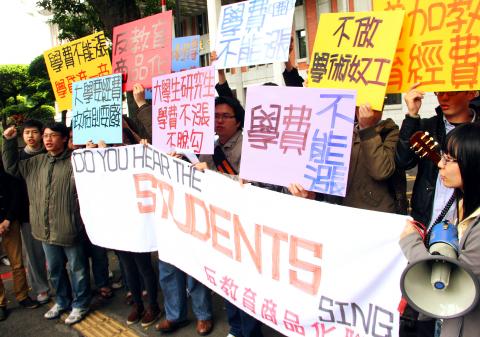Dozens of students yesterday demonstrated outside the Ministry of Education in Taipei, protesting its decision to allow universities to independently decide whether to raise tuition fees for graduate programs. The students expressed concern that the decision may result in a increase in fees for graduate students.
In a conference meeting with university and college presidents from across the nation last month, Minister of Education Chiang Wei-ling (蔣偉寧) said that school administrations would be free to decide whether to raise tuition fees for graduate programs, making many students worried that they may become an “ATM” for their schools.
“When students finish their degree, they go out and contribute to society based on what they have learned at school. Students should not be the ones who shoulder the rising costs of education,” said Chang Wen-hua (張文華), a graduate student at Taipei National University of the Arts and a representative of the Alliance Against Commoditization of Education. “Instead, the government should collect capital gains tax from businesses to fill universities’ financial gap, as most students go on to work for businesses after graduation.”

Photo: CNA
Chang said that graduate students are already suffering from cuts in research funds and that “things would only get worse for us if tuition fees go up and research budgets are cut.”
“We would become academic slave workers,” she added.
“I get a research budget of about NT$3,000 [US$101] a month, but 10 years ago, the amount was NT$8,000,” said Wang Chun-fang (王淳芳), a graduate student at National Chengchi University.
“With little budget and higher tuition fees, we will be forced to work multiple part-time jobs. How are we supposed to focus on our studies and do our research?” she asked.
Responding to the students’ protest, Department of Higher Education deputy director Ma Hsiang-ping (馬湘萍) said that because graduate school is not part of mandatory education, “it’s reasonable that the government, the school and the students should share the costs.”
“We are not likely to change the policy direction at the moment,” she said. “However, I don’t think universities are planning to raise tuition fees for graduate students, because competition is fierce because the number of children is declining each year.”

Alain Robert, known as the "French Spider-Man," praised Alex Honnold as exceptionally well-prepared after the US climber completed a free solo ascent of Taipei 101 yesterday. Robert said Honnold's ascent of the 508m-tall skyscraper in just more than one-and-a-half hours without using safety ropes or equipment was a remarkable achievement. "This is my life," he said in an interview conducted in French, adding that he liked the feeling of being "on the edge of danger." The 63-year-old Frenchman climbed Taipei 101 using ropes in December 2004, taking about four hours to reach the top. On a one-to-10 scale of difficulty, Robert said Taipei 101

Nipah virus infection is to be officially listed as a category 5 notifiable infectious disease in Taiwan in March, while clinical treatment guidelines are being formulated, the Centers for Disease Control (CDC) said yesterday. With Nipah infections being reported in other countries and considering its relatively high fatality rate, the centers on Jan. 16 announced that it would be listed as a notifiable infectious disease to bolster the nation’s systematic early warning system and increase public awareness, the CDC said. Bangladesh reported four fatal cases last year in separate districts, with three linked to raw date palm sap consumption, CDC Epidemic Intelligence

Two Taiwanese prosecutors were questioned by Chinese security personnel at their hotel during a trip to China’s Henan Province this month, the Mainland Affairs Council (MAC) said yesterday. The officers had personal information on the prosecutors, including “when they were assigned to their posts, their work locations and job titles,” MAC Deputy Minister and spokesman Liang Wen-chieh (梁文傑) said. On top of asking about their agencies and positions, the officers also questioned the prosecutors about the Cross-Strait Joint Crime-Fighting and Judicial Mutual Assistance Agreement, a pact that serves as the framework for Taiwan-China cooperation on combating crime and providing judicial assistance, Liang

US climber Alex Honnold left Taiwan this morning a day after completing a free-solo ascent of Taipei 101, a feat that drew cheers from onlookers and gained widespread international attention. Honnold yesterday scaled the 101-story skyscraper without a rope or safety harness. The climb — the highest urban free-solo ascent ever attempted — took just more than 90 minutes and was streamed live on Netflix. It was covered by major international news outlets including CNN, the New York Times, the Guardian and the Wall Street Journal. As Honnold prepared to leave Taiwan today, he attracted a crowd when he and his wife, Sanni,